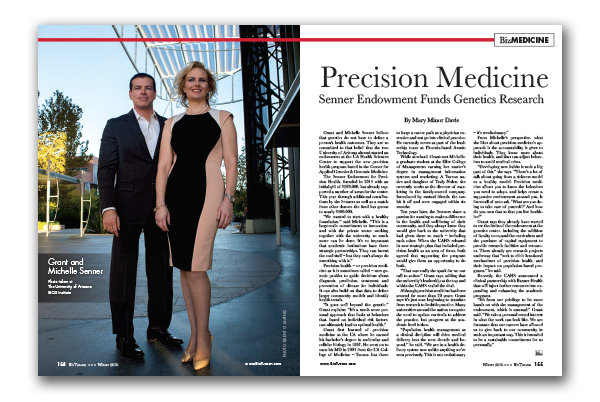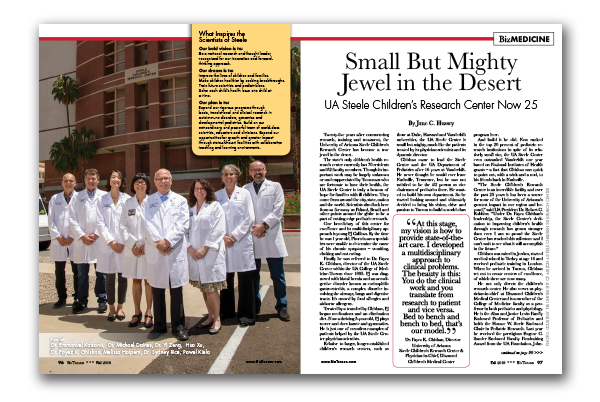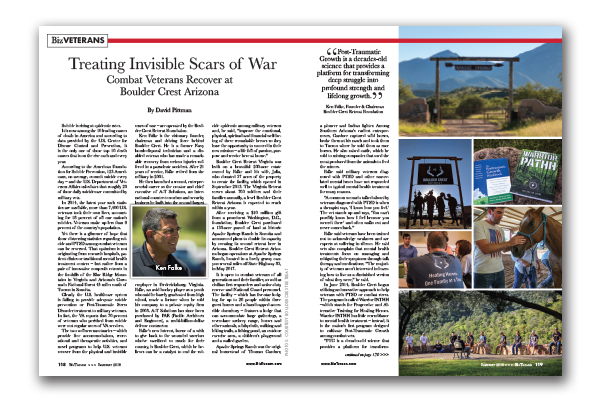
Senner Endowment Funds Genetics Research
Mary Minor Davis –
Precision Medicine – Senner Endowment Funds Genetics Research
Grant and Michelle Senner believe that genetics do not have to define a person’s health outcomes. They are so committed to that belief that the two University of Arizona alumni started an endowment at the UA Health Sciences Center to support the new precision health program based in the Center for Applied Genetics & Genomic Medicine.
The Senner Endowment for Precision Health, founded in 2014 with an initial gift of $280,000, has already supported a number of areas for the center. This year, through additional contributions by the Senners as well as a match from other donors, the fund has grown to nearly $400,000.
“We wanted to start with a healthy foundation,” said Michelle. “This is a large-scale commitment to innovation, and with the private sector working together with the university, so much more can be done. It’s so important that academic institutions have those strategic partnerships. They can invent the cool stuff – but they can’t always do something with it.”
Precision health – or precision medicine as it is sometimes called – uses genetic profiles to guide decisions about diagnosis, prediction, treatment and prevention of disease for individuals. It can also build on that data to define larger community models and identify health trends.
“It goes well beyond the genetic,” Grant explains. “It’s a much more personal approach that looks at behaviors that, based on individual risk factors, can ultimately lead to optimal health.”
Grant first learned of precision medicine at the UA where he earned his bachelor’s degree in molecular and cellular biology in 1997. He went on to earn his MD in 2004 from the UA College of Medicine – Tucson, but chose to forge a career path as a physician executive and not go into clinical practice. He currently serves as part of the leadership team at Phoenix-based Amnio Technology.
While at school, Grant met Michelle, a graduate student at the Eller College of Management earning her master’s degree in management information systems and marketing. A Tucson native and daughter of Truly Nolen, she currently works as the director of marketing in the family-owned company. Introduced by mutual friends, the two hit it off and were engaged within six months.
Ten years later, the Senners share a passion for wanting to make a difference in the health and well-being of their community, and they always knew they would give back to the university that had given them so much – including each other. When the UAHS released its new strategic plan that included precision health as an area of focus, both agreed that supporting the program would give them an opportunity to do both.
“That was really the spark for us, our call to action,” Grant says, adding that the university’s leadership at the top and within the UAHS sealed the deal.
Although precision medicine has been around for more than 20 years, Grant says it’s just now beginning to translate from research to bedside practice. Many universities around the nation recognize the need to update curricula to address the practice, but progress at the academic level is slow.
“Population health management as a clinical discipline will drive medical delivery into the next decade and beyond,” he said. “We are in a health delivery system now unlike anything we’ve seen previously. This is not evolutionary – it’s revolutionary.”
From Michelle’s perspective, what she likes about precision medicine’s approach is the accountability it gives to individuals. They know more about their health, and thus can adjust behaviors to avoid medical crises.
“Developing new habits is such a big part of this,” she says. “There’s a lot of talk about going from a sickness model to a healthy model. Precision medicine allows you to know the behaviors you need to adopt, and helps create a supportive environment around you. It forces all of us to ask, ‘What are you doing to take care of yourself?’ And how do you own that so that you live healthier?”
Grant says they already have started to see the fruits of the endowment at the genetics center, including the addition of faculty to expand the curriculum and the purchase of capital equipment to provide research facilities and resources. There already are research projects underway that “seek to elicit functional mechanisms of precision health, and their impact on population-based programs,” he said.
Recently, the UAHS announced a clinical partnership with Banner Health that will inject further resources into expanding and enhancing the academic programs.
“It’s been our privilege to be more hands on with the management of the endowment, which is unusual,” Grant said. “We take a personal vested interest in what the work can look like. We are fortunate that our careers have allowed us to give back to our community in such an important way. This is intended to be a sustainable commitment for us personally.”





